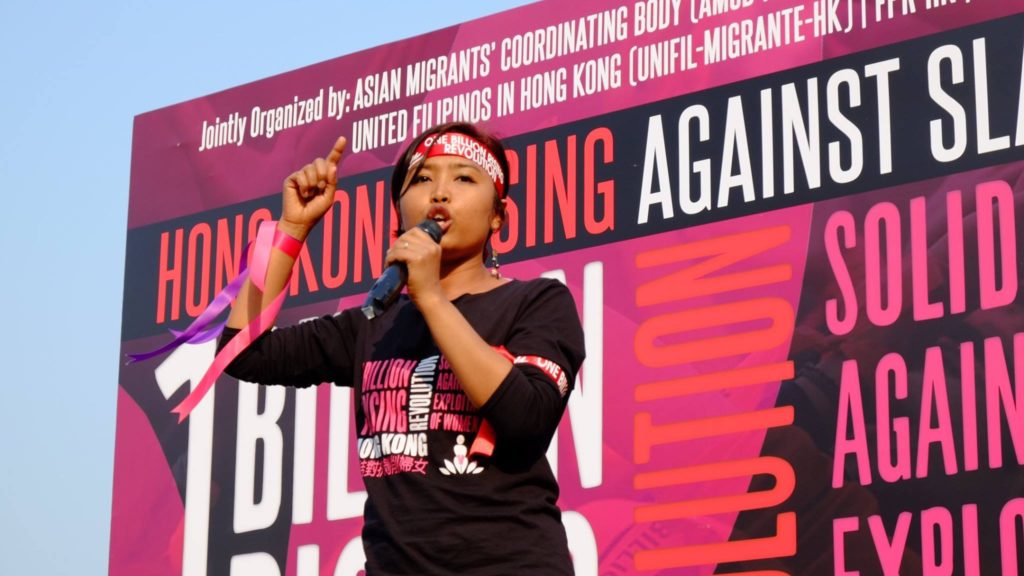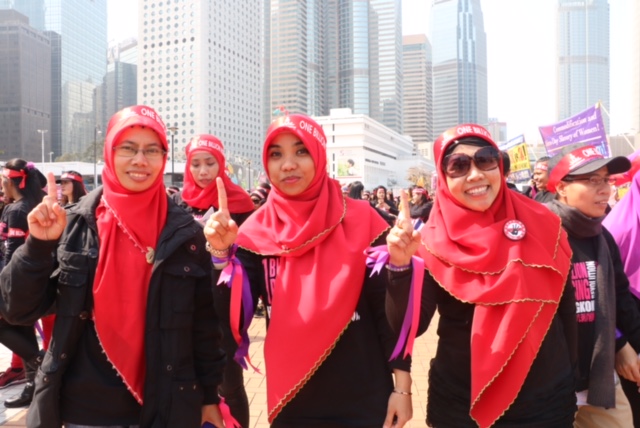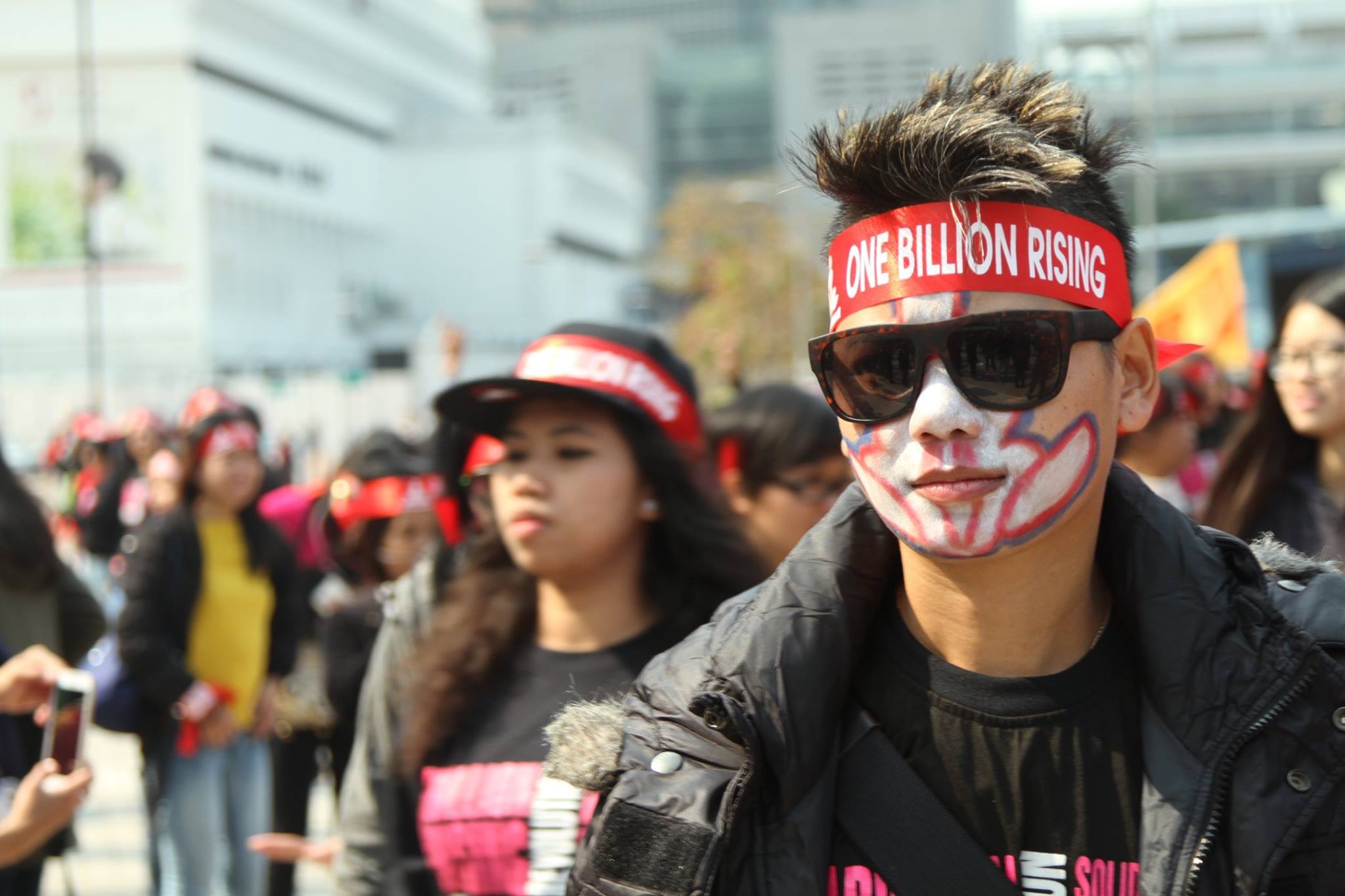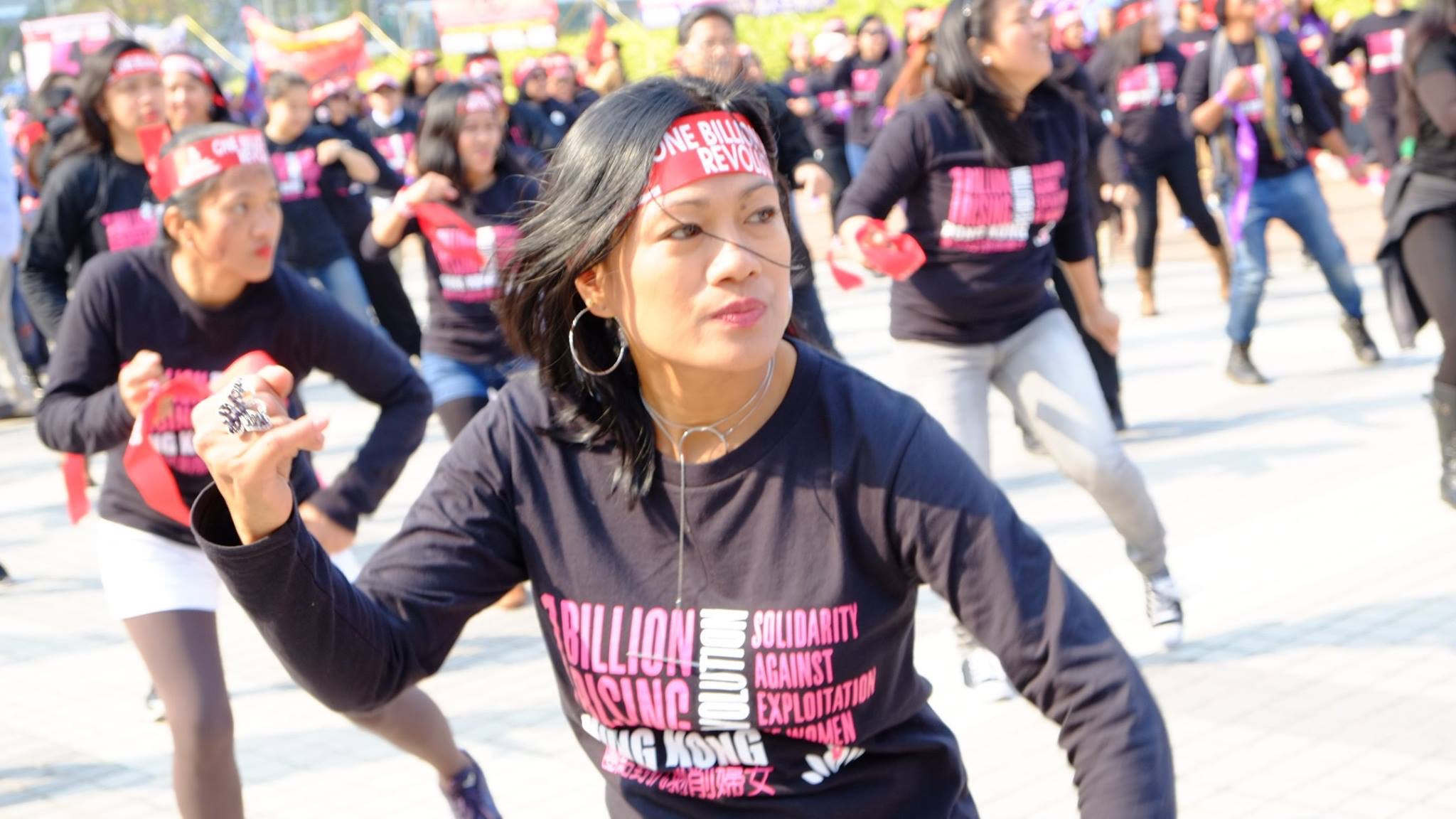
*Jointly organized by an international alliance of migrant domestic worker groups in HK made up of Asian Migrants Coordinating Body (AMCB), Jaringan Buruh MIgran Indonesia (JBMI), International Migrants Alliance (IMA – Hong Kong & Macau), Gabriela Hong Kong, United Filipinos in Hong Kong (UNIFIL-MIGRANTE-HK), FPR-HK, BAYAN HK & Macau and ILPS HK
Hong Kong Rising Against Slavery and Exploitation was our OBR Revolution 2017 theme for this year. It captures both the particularity of the slavery of the more than 340,000 migrant domestic workers in Hong Kong (from the Philippines, Indonesia, Nepal, Bangladesh and Sri Lanka), and at the same time general exploitative conditions of women in Hong Kong specially in the workplace.
OBR HK 2017 highlighted different forms of abuses of local and migrant women in the economic, political and social spheres. This included the attacks on the basic rights of workers such as low wages, extremely long working hours, erosion of benefits and the declining standard of living caused by skyrocketing costs of housing, increase in prices of food commodities and the ever-increasing cost of transportation has made the lives of both local and migrant women worse than ever.
The OBR HK 2017 campaign, with “Solidarity Against the Exploitation of Women” as the theme, had the following impact:
*Awareness to understand history of OBR and recognize multilayers of violence against Indonesian women migrants increased through discussion and socialization
*Through active propaganda and education specially among AMCB (Asian Migrants Coordinating Body)-led mass organizations, there was a significant development in the awareness and understanding on comprehensiveness of VAW not limited to the physical but the more serious social and economic violence.
*The linking of local struggles and campaigns, in particular the case Erwiana – gave more people the recognition of the importance and strength of solidarity for the many issue that we are struggling with. Concretely, the campaign against modern-day slavery has gained popularity and its existence in Hong Kong can no longer be denied.
*Participation of the local grassroots women is continuously increasing and improving for the past 4 risings. While participation is still mainly from migrant domestic workers, the conscious effort to involve local groups from the planning stage, to the public education and the actual execution of the event – is producing positive results in the mobilization of local women.

The Risings always come with particular challenges. These are some of the following:
* Venue – from the dance competitions up to the actual OBR, the strategic public spaces have been increasingly difficult to secure.
* Outdoor activities affected by wet and cold weather.
* Reaching out to more groups to socialize and teach OBR due to limited human resources. Muslim groups are difficult to convince due to religious beliefs that dance is not permitted in Islam.
* Budget to organize the various activities
* Increasing social media presence
* Further improving the participation of local women’s groups and sectors
* Strategies on how to involve other “traditional” organizations in the OBR
* Chinese New Year schedule causing many domestic workers to not have rest days.
* How to unify the diverse issues faced by local women from various sectors with the issues faced by migrants and other ethnic minorities and turn this into a common call and action through OBR Revolution.

But despite the challenges we came up with the following strategies to ensure that OBR HK 2017 would be even more impactful than past years:
* Continued to organize “guerilla” and “informal” events in the parks despite repeated warnings from park security and management.
* Collection of donation from supporters and migrant groups
* Designated several persons to help in outreaching and teaching OBR dances
* Training of “social media warriors”, teams of social media savvy migrant workers to promote and popularize OBR Revolution
* Utilization of skype and other internet-based modes of communication for briefing, coordination and planning for OBR Revolution
* Promotion of OBR Revolution in different social events and forums organized by other groups/church and through dance performances in different community gatherings
* Practices of OBR held with local groups to encourage the local networks to participate in OBR Revolution
Collectively we also came up with the following political, social and artistic strategies to further promote and outreach OBR Revolution and increase engagement:
* A small team composed of 5 persons was formed to work on the Bahasa Indonesia translation of the “Break the Chain” song and conceptualized the Indonesian version dance choreography.
* We designated 3 persons to talk to media and explain about OBR and invited them to cover our events
* Socially, we organized various activities to promote OBR and explain what violence means in the context of forced labour migration.
* We maximized the OBR as a platform to popularize and advance our sectoral campaigns and struggles
* All the events and activities of AMCB (Asian Migrants Coordinating Body) -led organizations were maximized to promote OBR and discuss the different forms of abuse and violence against women and children.
* We designated our distinct cultural organization to be the main machinery in teaching and promoting the OBR dance choreographies the different locations where we are organizing migrants.

And we further escalated our creative and artistic ideas on OBR’s fifth year, to capture attention, imagination and involvement of more migrant domestic worker groups:
* The translation of the “Break the Chain” song to Bahasa Indonesia is one of our major achievements this year.
* The organizing of OBR dance competitions among Filipinos and Indonesian migrants 6 months before the actual OBR Revolution
* OBR Karaoke singing through online Smule
* In the anniversary event of Gabriela Hong Kong, different dance groups were tapped to join the OBR dance competition and to develop their own choreography based on OBR-inspired dance music (for example: “We are Beautiful” from OBR Tilburg and “Rising”). Participating groups were also required to perform together in one grand dance production of the official OBR songs.
* OBR practices every Sunday (the day off of domestic workers in Hong Kong were done in highly visible public areas to promote wider public awareness.
* Encouraged the different participating groups to the OBRR to create their own gimmicks and artistic designs specially during the OBR march-parade.
* Printing of OBR Hong Kong t-shirts
More and more each year, different sectors come into the campaign to join. This year we had the following sectors represented:
* Indigenous peoples ( from ATIS & Cordillera Alliance – Philippines)
* Students
* Local Hong Kong women’s groups
* Chinese and foreign employers of migrant domestic workers
* Migrant domestic workers
* Churches/faith-based groups
* Diaspora communities

These is the following general feedback we received for OBR HK 2017:
* Many were impressed by the well-organized execution of the OBR Revolution
* Local women were impressed with the level of mobilization by migrant groups given their limited rest days and live-in condition.
* Many first-time participants were happy with the program and the content of the advocacy and pledged to join again in the future risings.
From year 1 to 5, there have been many significant changes and developments to our OBR Hong Kong campaign:
* The first OBR in 2013 was still decentralized – one in Central (by Filipinos) and one in Victoria Park (by Indonesians). Not much local participation and lacking international coordination. Social media presence was also very low.
* The 2014 OBR for Justice was a significant improvement because its was particularly linked to the local struggle for justice for Erwiana and all MDWs (Migrant Domestic Workers). It was organized for the first time jointly by all AMCB (Asian Migrants Coordinating Body) members together with several local women’s organizations and unions. Media coverage, both local and international, was exemplary.
* The 2015 OBR Revolution was very successful and significant in the sense that it was the year Erwiana won her case.
* In 2016, the 4th and biggest OBR Revoution was held and for the first time, a march-parade was added in the major components of the rising. Several local organizations also co-organized the event. The presence of Eve Ensler caught the attention of the media and the rising managed to get international and local landings in newspapers and online media. The social media presence was more systematic and organized and was highly visible (with live streaming)
* This year’s OBR Revolution was better organized in terms of using it as a platform in raising issues of both local and migrant women. Each of the different nationalities made use of OBR to advance their national and local concerns and issues and united in a common theme against slavery and exploitation of local and migrant women.
* Some of the breakthroughs this year are (1) the composition of Indonesian OBR song and dance; (2) Participation of local students from different universities in Hongkong; and (3) Participation of the local and migrant LGBTQ communities.

Migrant domestic workers and their supporters and allies continue to Rise in Hong Kong because of the issues that are gravely affecting migrant domestic workers in the country (Hong Kong), as well as in their countries of origin (Indonesia, Philippines, Sri Lanka, Bangladesh, Nepal)
* The Labor Export Policies of the sending countries (i.e. Philippines, Indonesia, etc.), the slavery and social exclusion in the receiving end (Hong Kong), and the very low regard and value for domestic workers/domestic work in both sending and receiving countries.
* Forced labour and human trafficking.
* Public housing, education and healthcare – decreasing government budget allocation
As migrants domestic workers in HK, we love the theme of “Solidarity against the exploitation of women” as it shows that women emancipation can be achieved only through unity and solidarity. And we feel it is broad enough for different constituents to translate and adapt to their own realities and particularities. We would definitely want to continue doing OBR, as OBR is already a regular campaign and advocacy platform in Hong Kong specially for migrant domestic workers. It’s uniqueness and broadness makes it an effective platform for public awareness raising and mass mobilization for the campaign against VAW.
HONG KONG RISING FOR REVOLUTION!